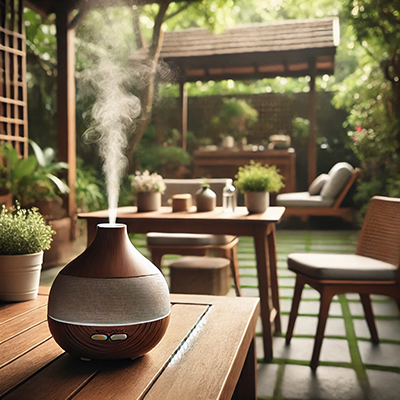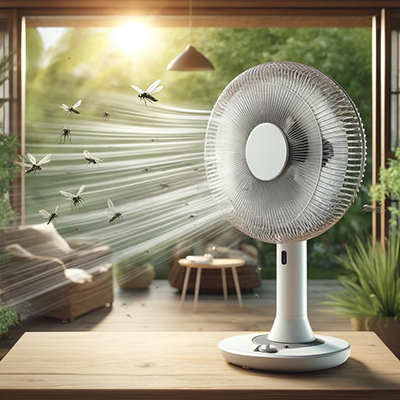Contents
- 1 Essential Oil Powerhouses: Nature’s Fragrant Armor
- 2 Other Essential Oils for Your Arsenal
- 3 How to Use Essential Oils as Home Remedies for Mosquito Repellents
- 4 Diffusers: Creating a Mosquito-Free Zone
- 5 Topical Application: A Direct Defense
- 6 Plants That Repel: Nature’s Fragrant Guardians
- 7 Other Repellent Plants to Consider
- 8 DIY Mosquito Repellent Recipes: Concoctions for a Bite-Free Zone
- 9 Additional Tips and Tricks: Fortifying Your Mosquito-Free Fortress
- 10 Eliminate Standing Water: Deny Them a Nursery
- 11 Use Fans: Create a Windstorm They Can’t Handle
- 12 Screen Doors and Windows: Build a Physical Barrier
- 13 Wear Light-Colored Clothing: Make Yourself Less Appealing
- 14 Stay Vigilant: A Multi-Faceted Approach
- 15 When to Consider Professional Help: Knowing Your Limits
- 16 Benefits of Professional Mosquito Control
- 17 Finding the Right Professional
- 18 Embrace Nature’s Bounty: Your Path to a Bite-Free Oasis

Buzz off, mosquitoes! Hold on if the incessant whining and itchy bites have you reaching for the bug spray. There’s a natural way to protect yourself and your loved ones from these pesky pests, and they are likely hiding in your pantry or garden. Say hello to the world of home remedies for mosquito repellent, your ticket to a bite-free summer.
Mosquitoes are more than annoying – they can carry harmful diseases like West Nile and Zika. While chemical repellents offer protection, many seek safer, more natural alternatives, especially for young children and pets. That’s where the power of nature comes in. Surprisingly, many everyday ingredients and plants pack a powerful punch against mosquitoes.
This guide examines the science-backed home remedies that genuinely work, from potent essential oils to fragrant plants that mosquitoes detest. We’ll also share DIY recipes for creating effective repellents and reveal simple tricks to keep these bloodsuckers at bay. So, ditch the DEET and embrace the power of nature – your skin and your family will thank you.
Essential Oil Powerhouses: Nature’s Fragrant Armor
Essential oils extracted from plants are far more than aromatherapy tools. These concentrated liquids contain potent compounds that mosquitoes find downright repulsive. Let’s explore some of the most effective oils to add to your anti-mosquito arsenal.
Citronella Oil: A Classic Defender
You’ve likely encountered citronella candles at outdoor gatherings. Citronella oil, derived from lemongrass, is a time-tested mosquito repellent. Its strong, citrusy scent masks the attractants that lure mosquitoes, making it harder for them to find you.
While citronella is generally safe, avoid applying it directly to your skin. Instead, create a DIY spray by mixing a few drops with water or witch hazel and spritz it on your clothes or exposed skin. You can use citronella oil in diffusers to create a mosquito-free zone on your patio or deck.
Lemon Eucalyptus Oil: The DEET Competitor
Move over, DEET! Lemon eucalyptus oil is a plant-based powerhouse that rivals the effectiveness of this synthetic repellent. Research suggests it provides long-lasting protection against mosquito bites, making it an excellent choice for outdoor adventures.
When shopping for lemon eucalyptus oil, look for products that contain PMD (p-menthane-3,8-diol), the active ingredient responsible for its repellent properties. As with other essential oils, dilute it before applying it to your skin.
Lavender Oil: Beauty and Protection
Lavender isn’t just a calming scent for bedtime; it also packs a mosquito-repelling punch. This fragrant oil disrupts a mosquito’s ability to smell, making it less likely to find you a tasty target.
Enjoy lavender’s dual benefits by diffusing it indoors or outdoors. This creates a relaxing ambiance while warding off unwanted guests. You can also apply drops with carrier oil to your pulse points for added protection.
Other Essential Oils for Your Arsenal
- Peppermint Oil: The refreshing scent of peppermint repels mosquitoes and refreshes you.
- Tea Tree Oil: Known for its germicide properties, it can soothe mosquito bites and help prevent infection.
- Rosemary Oil: This versatile oil adds flavor to dishes and, when burned or used in a diffuser, helps deter mosquitoes.
- Geranium Oil: With its sweet floral scent, geranium oil is a pleasant way to keep mosquitoes away.
Feel free to experiment with different blends of essential oils to find your perfect natural repellent.
How to Use Essential Oils as Home Remedies for Mosquito Repellents

Now that you’ve stocked up on mosquito-repelling essential oils, it’s time to put them to work. Thankfully, there are quite a few easy and effective ways to incorporate these fragrant powerhouses into your daily routine:
DIY Mosquito Repellent Sprays
Transform your essential oils into a convenient spray by mixing a few drops with water or witch hazel. This creates a DIY mosquito repellent that you can easily apply to your skin or clothes. Combine the following in a spray bottle:
- 1/4 cup witch hazel or distilled water
- 10-20 drops of your chosen essential oils (citronella, lemon eucalyptus, lavender, etc.)
- Shake well before each use and spritz liberally.
Remember, a little goes a long way with essential oils. Start with a lower concentration and progressively increase it until you find what works best.
Diffusers: Creating a Mosquito-Free Zone
Diffusers are an excellent way to disperse essential oils’ mosquito-repelling aroma throughout your home or outdoor space. Add a few drops of the indicated oils to the diffuser, fill it with water, and let the fragrant mist work its magic.
For outdoor use, consider portable or battery-operated diffusers that you can strategically place around your patio or deck. These diffusers create a barrier against mosquitoes, allowing you to enjoy your time outside without worry.
Topical Application: A Direct Defense
You can also apply watered-down essential oils to your skin for direct protection. Always mix essential oils with carrier oil like coconut, jojoba, or sweet almond oil prior to applying to avoid irritation.
A general rule of thumb is to use 12 drops of essential oil per particle of carrier oil. Apply the mixture to your pulse points (wrists, ankles, neck) and other exposed skin for extra defense against mosquito bites.
Remember: When using essential oils topically, always perform a patch test first to make sure you don’t have any bad reactions. If you experience any irritation, discontinue use immediately.
Plants That Repel: Nature’s Fragrant Guardians
Looking for a more decorative way to deter mosquitoes? Look no further than your garden or local nursery. Many common plants possess natural mosquito-repelling properties, adding beauty and protection to outdoor spaces.
Marigolds: Golden Guardians of the Garden
Marigolds are cheerful, easy-to-grow flowers that brighten up any garden. But their vibrant blooms aren’t their only asset. These sunny flowers contain pyrethrum, a compound commonly found in commercial insecticides.
Plant marigolds around your yard, pathways, or porch in pots to create a natural barrier against mosquitoes. For protection, crush marigold leaves and scatter them around outdoor seating areas.
Basil: Culinary Delight and Pest Deterrent
Basil, the fragrant herb that elevates your favorite pasta dishes, is also a formidable mosquito foe. The pungent aroma of basil leaves confuses mosquitoes, making it difficult for them to locate you.
Place pots of basil near doorways, windows, or outdoor seating areas to create a mosquito-repelling zone. As a bonus, you’ll have fresh basil for your culinary creations.
Catnip: More Than a Feline Favorite
Catnip isn’t just for your furry friends; it’s also a surprisingly potent mosquito repellent. Research suggests that nepetalactone, the active ingredient in catnip, is up to ten times more effective than DEET at repelling mosquitoes.
While your cat may enjoy rolling around in catnip, you can also use it strategically to deter mosquitoes. Plant catnip in your lawn or place dried sachets around your outdoor areas to keep those buzzing pests at bay.
Rosemary: A Fragrant Shield
Rosemary is another versatile herb that is also a natural mosquito repellent. Its woody aroma deters mosquitoes, especially when the plant is burned.
Toss rosemary sprigs on your grill or campfire to create a mosquito-repelling smoke screen. For ongoing protection, you can also grow rosemary or place potted plants around your outdoor spaces.
Other Repellent Plants to Consider
Lavender: This fragrant flower adds beauty to your garden and helps repel mosquitoes.
Peppermint: The refreshing scent of peppermint is a natural deterrent to mosquitoes.
Lemon Balm: This lemony herb is a favorite of bees but repels mosquitoes with its citrusy aroma.
By strategically integrating these plants into your landscape, you can create a natural barricade against mosquitoes while adding visual appeal to your outdoor spaces.
DIY Mosquito Repellent Recipes: Concoctions for a Bite-Free Zone
Ready to improve your mosquito-repelling skills? Let’s explore some simple, homemade recipes that use readily available ingredients to create compelling, natural repellents.
Vinegar and Witch Hazel Spray: A Refreshing Shield
This simple concoction combines vinegar’s pungent aroma with witch hazel’s soothing properties to create a surprisingly effective mosquito repellent. Vinegar’s strong scent masks the attractants that mosquitoes use to find their prey. At the same time, witch hazel helps to soothe any existing bites and reduce inflammation.
To make this spray, combine apple cider vinegar and witch hazel in a spray bottle. Add a little drop of lavender, lemon eucalyptus, or peppermint oil for an extra layer of protection and a pleasant fragrance. Shake well before each use and spritz liberally on your skin and clothes.
Garlic Spray: A Pungent Protector
Garlic may ward off more than just vampires. This aromatic ingredient also deters mosquitoes due to its strong odor. While you may not want to smell like garlic, this spray is a powerful natural option for protecting your outdoor spaces.
To make garlic spray, blend several garlic cloves with water in a blender or food processor. Strain the mixture via a cheesecloth or fine-mesh sieve and dilute it with water in a spray bottle. Apply the spray around your yard, patio, or other outdoor areas to create a mosquito-repelling barrier.
Apple Cider Vinegar Trap: A Sweet and Sour Demise
While not a repellent in the traditional sense, this clever trap uses the sweet aroma of apple cider vinegar to lure mosquitoes to their doom. The mosquitoes are attracted to the scent, but the dish soap added to the mixture breaks the surface pressure of the liquid, causing them to drown.
To create this trap, fill a jar or vessel with apple cider vinegar. Add a little drop of dish soap and stir gently. Place the trap in areas where mosquitoes are likely to congregate. To enhance its effectiveness, you can also add essential oils like citronella or lemon eucalyptus.
Additional Tips and Tricks: Fortifying Your Mosquito-Free Fortress
While home remedies for mosquito repellent offer excellent protection, combining them with other preventative measures creates a comprehensive defense against these pesky insects. Let’s explore some further tips and tricks to enhance your mosquito-proofing efforts.
Eliminate Standing Water: Deny Them a Nursery
Mosquitoes breed in dormant water, so the first step in any mosquito control plan is to eliminate potential breeding grounds. Regularly empty and scrub birdbaths, flower pots, gutters, and other containers that collect water.
If you have a pond or other water feature, consider adding mosquito-eating fish like guppies or minnows. These natural predators can help keep mosquito larvae populations in check.
Use Fans: Create a Windstorm They Can’t Handle

Mosquitoes are weak flyers and struggle against even a gentle breeze. Take advantage of this by placing fans strategically around your outdoor spaces.
Oscillating fans are particularly effective at creating a wind current that mosquitoes find challenging to navigate. Ceiling or box fans can also help keep the air moving and make outdoor spaces less inviting to these buzzing pests.
Screen Doors and Windows: Build a Physical Barrier
Mounting screens on your doors and windows is one of the simplest and most effective ways to keep mosquitoes out of your home. Ensure that screens are in good repair and free of holes or tears.
If you enjoy being on your porch or patio, think about using mosquito netting to create a protective enclosure. This allows you to enjoy the fresh air without becoming a mosquito buffet.
Wear Light-Colored Clothing: Make Yourself Less Appealing
Mosquitoes are attracted to darker colors, so sporting light-colored clothing can help to make you a less appealing target. Opt for long-sleeved shirts and pants outdoors, especially during peak mosquito hours (dawn and dusk).
You can also treat your garments with permethrin, an insecticide that repels and kills mosquitoes. Permethrin-treated clothing offers long-lasting protection and is safe for humans when used as directed.
Stay Vigilant: A Multi-Faceted Approach
Remember, the most effective mosquito control strategy involves a multi-faceted approach. Combine home remedies for mosquito repellent, preventative measures, and strategic use of barriers to create a mosquito-free zone around your home and outdoor spaces. By staying vigilant and proactive, you can enjoy your time outdoors without the frustration of mosquito bites.
When to Consider Professional Help: Knowing Your Limits
While home remedies for mosquito repellent and DIY solutions are effective for many mosquito problems, some situations may warrant calling professionals. If you’re facing a persistent or overwhelming mosquito infestation, don’t hesitate to seek expert assistance.
Signs You May Need a Pro
- Overwhelming Numbers: If you’re constantly swatting away mosquitoes despite your best efforts, it may be time to call reinforcements. Large swarms of mosquitoes, especially during the day, can indicate a breeding ground nearby that requires professional attention.
- Persistent Breeding Sites: If you’ve eliminated all visible sources of standing water but still see mosquitoes breeding, they may find hidden spots to lay their eggs. Professionals can identify and treat these hard-to-reach areas.
- Ineffective Home Remedies: If you’ve tried various home remedies for mosquito repellents with little to no success, a professional can offer more potent and targeted solutions.
- Disease Concerns: If you live in an area at high risk of mosquito-borne diseases or have concerns about the risks linked to mosquito bites, a professional can provide expert advice and treatment options.
Benefits of Professional Mosquito Control
Professional pest control establishments have access to specialized equipment, insecticides, and knowledge to effectively control mosquito populations. They can assess your property, detect breeding sites, and implement targeted treatments to eliminate mosquitoes at all stages of their life cycle.
Professional services may include:
- Larvicides: These treatments target mosquito larvae in standing water, preventing them from developing into adults.
- Adulticides: These insecticides kill adult mosquitoes on contact, providing immediate relief from biting.
- Source Reduction: Professionals can identify and eliminate potential breeding sites, making your property less attractive to mosquitoes.
Finding the Right Professional
When choosing a pest control company, look for a licensed and insured provider with experience in mosquito control. Ask about their treatment methods, the safety of the products they use, and the expected duration of treatment. Be sure to get a written estimate before any work begins.
While professional mosquito control may be an investment, it can provide peace of mind and long-lasting relief from these annoying and potentially dangerous pests. By working with a recognized professional, you can get back to your outdoor spaces and enjoy a mosquito-free environment.
Embrace Nature’s Bounty: Your Path to a Bite-Free Oasis
As you’ve discovered, nature provides many options for repelling mosquitoes and protecting yourself from their irritating bites. By harnessing the power of essential oils, planting strategic greenery, and crafting DIY solutions, you can create a haven free from these buzzing nuisances.
The beauty of home remedies for mosquito repellents lies in their versatility and customization. Experiment with different combinations of essential oils, plant a variety of mosquito-repelling flora, and try homemade concoctions to find what works best for you and your family.
Remember, a multi-pronged approach is often the most effective. Combine your natural repellents with preventative measures like eliminating standing water, using fans, and wearing protective clothing. By taking a proactive stance and embracing nature’s arsenal, you can reclaim your outdoor spaces and enjoy the summer without the constant threat of mosquito attacks.
So, don’t reach for the chemical-laden spray the next time you hear that telltale buzz. Instead, turn to your garden, pantry, or essential oil collection. With creativity and the wisdom of nature, you can create a safe, fragrant, and mosquito-free sanctuary for yourself and your loved ones. Important Note: While home remedies for mosquito repellents are generally safe, it’s always wise to check with your doctor or a healthcare expert if you have any concerns, especially if you’re pregnant, breastfeeding, or have any underlying health conditions. Some essential oils may not suit everyone, so consistently execute a patch test before applying them to your skin.
Health Disclaimer: The information on this website is for educational uses only and is not a substitute for professional medical advice. Always consult an authorized healthcare provider for any health concerns before using any herbal or natural remedy. We do not establish, treat, cure, or prevent any disease. Reliance on any material from this website is solely at your own risk. We are not responsible for any adverse effects resulting from the use of information or products mentioned on this website.
References
- Centers for Disease Control and Prevention (CDC): [invalid URL removed]
- National Pesticide Information Center (NPIC): http://npic.orst.edu/factsheets/citronellagen.html
- National Pesticide Information Center (NPIC): http://npic.orst.edu/ingred/ptype/repel.html
- National Institutes of Health (NIH): https://pubmed.ncbi.nlm.nih.gov/10836632
- National Pesticide Information Center (NPIC): http://npic.orst.edu/factsheets/repellents.html
- National Association for Holistic Aromatherapy (NAHA): https://naha.org/explore-aromatherapy/safety
